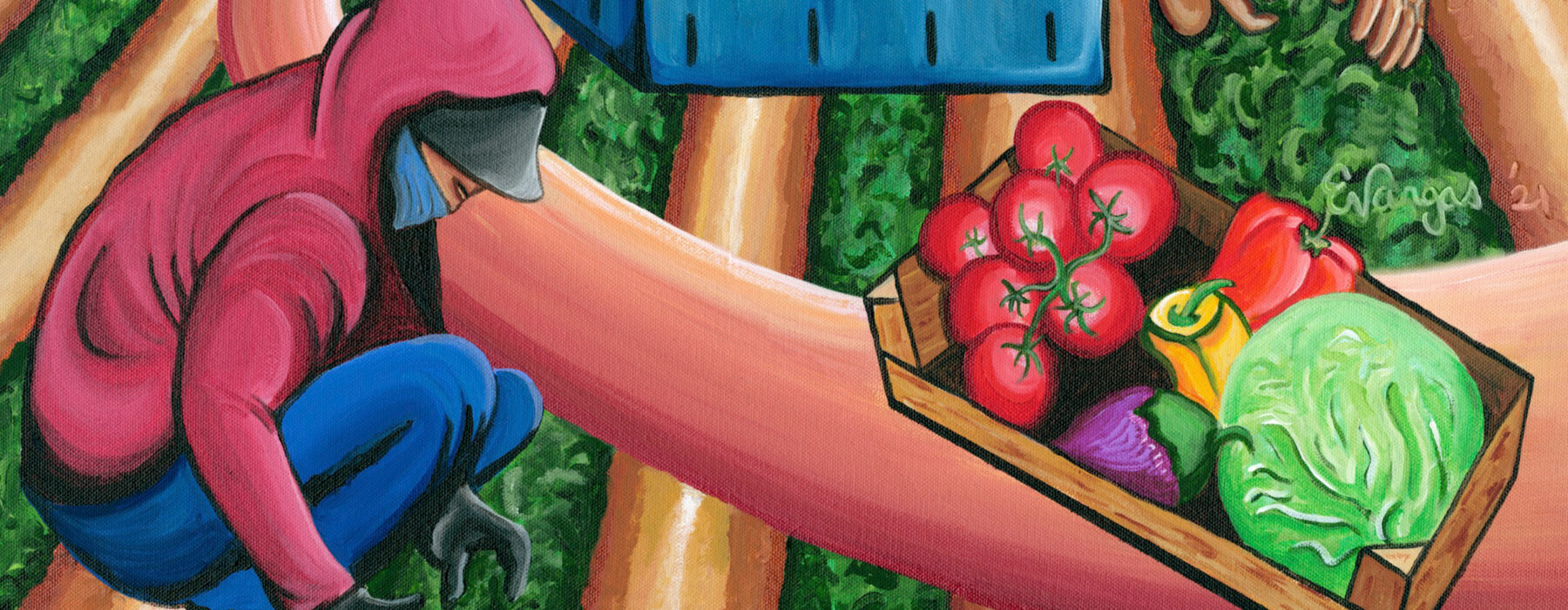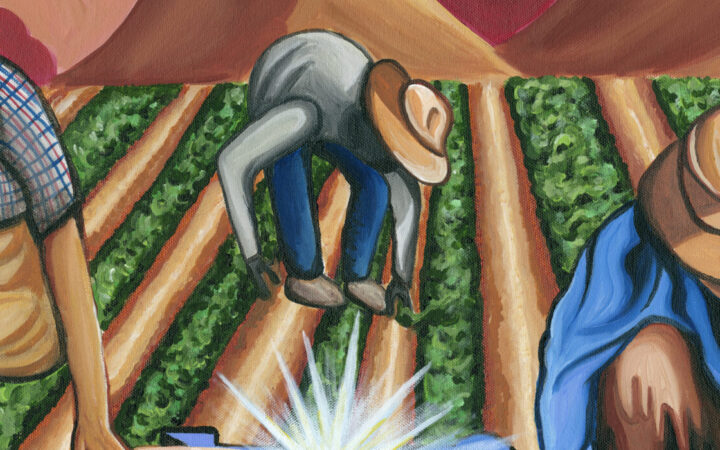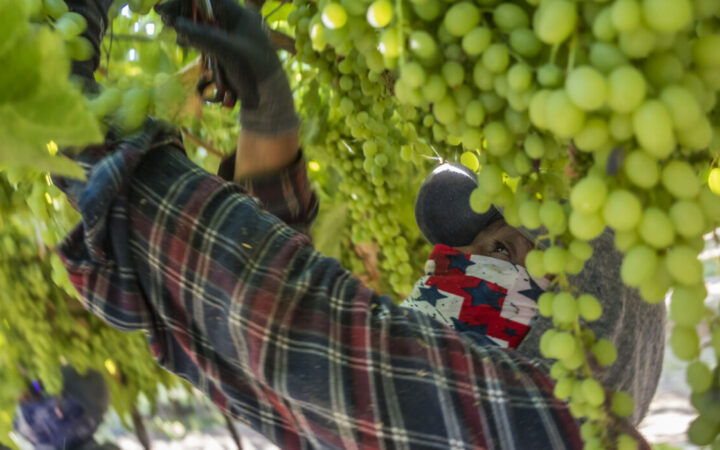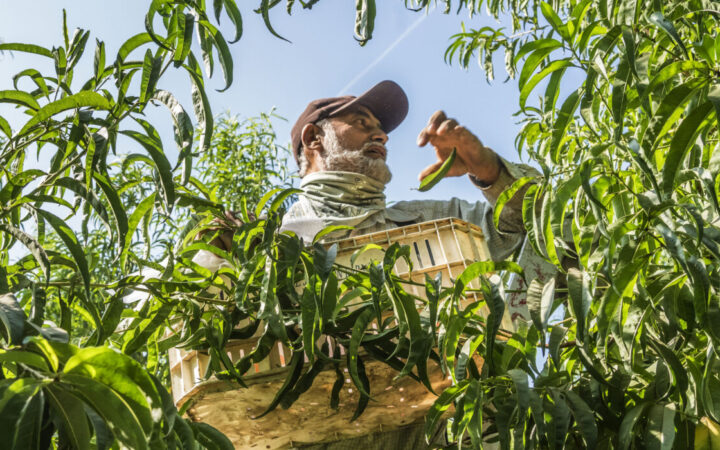This report, published by the Johns Hopkins Center for a Livable Future, reviews available research on a variety of public health threats that farmworkers face and demonstrates how these health burdens are, in part, the result of laws, policies, and practices intentionally designed to limit this workforce’s resources and recourse to fight against unsafe working conditions.
Introduction
On March 19, 2020, in the midst of a global pandemic, the federal government declared farmworkers “essential workers.” From California to New York, the same communities called upon to keep Americans fed during an unprecedented period of sickness and uncertainty also suffered some of the most horrific Covid-19 infection and fatality rates.
While individuals across the country grappled with the devastating impacts of the Covid-19 pandemic, farmworkers throughout the United States were among those the US government called upon to risk their health and the health of their communities in order to keep groceries on the shelves for millions of Americans. Despite the government’s public acknowledgement of the essential role that farmworkers fill in our food system, farmworkers were denied the most basic public health protections.
This incongruity was nothing new. Amerincas have long relied on the skilled and arduous labor of farmworkers to fuel our food system, while the US government and agricultural employers fail to provide protection or address systemic problems that make workers vulnerable to sickness. Moreover, Covid-19 has only exacerbated existing inequalities in our food system. Any future shocks to the US food system could leave farmworkers further exposed to exploitation and health risks.
In this report, which is an update to the Johns Hopkins Center for a Livable Future’s 2017 report, “Public Health, Immigration Reform, and Food System Change,” we review available research on a variety of public health threats that farmworkers face. We demonstrate how these health burdens are, in part, the results of laws, policies and practices that are intentionally designed to limit this workforce’s resources and recourse to fight against unsafe working conditions. We assert that the skills, knowledge, and contributions of people in the agricultural workforce must be adequately compensate and their rights to safety and health honored. Throughout this report, the voices of farmworkers and farmworker advocates are included to highlight the strength, ingenuity, and knowledge of these skilled professionals.
This report focuses on farmworkers in production agriculture. We review literature on this topic that has been published since 2016, when we conducted research for the first iteration of this report. The first half of the report provides policy-related background information and considers the social contexts of unsafe working conditions that are often associated with negative health impacts for farmworkers. The second half of the report summarizes the public health threats that farmworkers face. Each section describes how farmworkers are exposed to these health hazards and provides information about the short and long-term effects on farmworker health. The sections conclude with a description of individual and systemic interventions, opportunities and challenges to reducing these health impacts. Each section is structured so that it can serve as a stand-alone resource.
While the Covid-19 pandemic has displayed decision makers’ unwillingness to address farmworkers’ exploitation, it simultaneously provides a wake-up call to millions of Americans across the country. When workers receive the rights, protections, and compensation they have fought for and deserve, our food system, our agricultural communities, and our collective wellbeing will become stronger.
Acknowledgements
This report was produced by the Johns Hopkins Center for a Livable Future. The report benefited from significant input and editing support from Laurie J. Beyranevand, Professor of Law and Director of the Center for Agriculture and Food Systems at Vermont Law School, and Lihlani Skipper Nelson, Associate Director and Research Fellow, Center for Agriculture and Food Systems at Vermont Law School, who led the development of a companion report documenting state laws and policies addressing farmworkers pesticide exposure and heat-related illness entitled “Essentially Unprotected: A Focus on Farmworker Health Laws and Policies Addressing Pesticide Exposure and Heat-Related Illness”
This report benefited from significant research and data synthesis from Katherine Sollee and Mary (Molly) Miller. We also acknowledge Lori Rosman at the Johns Hopkins Welch Medical Library for her technical support and guidance on database reviews. The CLF authors of the report would like to thank Dr. Martin Bloem for his support.
We thank the following contributors to this report: Sonia Singh, Co-Director & Christina Spach, Food Policy Campaigns Coordinator, Food Chain Workers Alliance, Julia Jordan, Policy Coordinator, Leadership Counsel for Justice and Accountability, Sulma Guzmán, Policy Director & Legislative Counsel, Centro de los Derechos del Migrante, and Rudy Arredondo, President/CEO, National Latino Farmers & Ranchers Trade Association.
We thank the following individuals for reviewing this report: Nezahualcoyotl Xiuhtecutli, Research Coordinator, Farmworker Association of Florida, Marla Larrave, Political Education Director, HEAL Food Alliance, Margaret Reeves, Senior Scientist, Pesticide Action Network North America (reviewed pesticides section), Roni Neff, Program Director, Research Program and Food System Sustainability & Public Health, Johns Hopkins Center for a Livable Future D’Ann Williams, Senior Program Officer, Industrial Food Animal Production, Johns Hopkins Center for a Livable Future Shawn McKenzie, Deputy Director, Johns Hopkins Center for a Livable Future Christine Grillo, Contributing Writer, Johns Hopkins Center for a Livable Future. Any arguments, or recommendations are those of the authors and may not reflect those of the reviewers. We thank the reviewers for their enormously thoughtful guidance and feedback on the report’s content.
Cover Art: Johns Hopkins Center for a Livable Future and Elias Vargas, Elias Vargas Art, original artwork.



